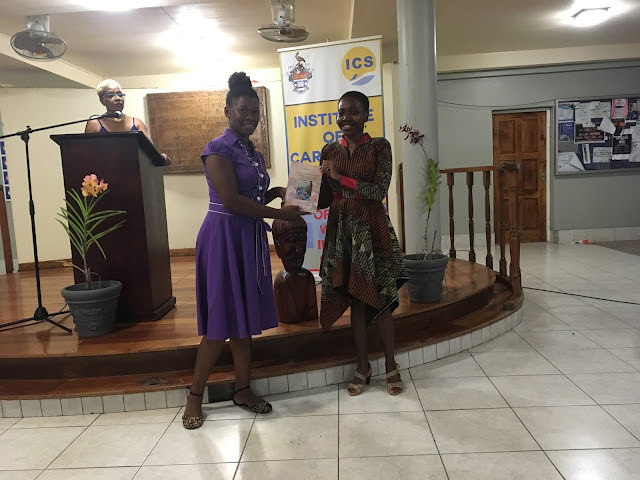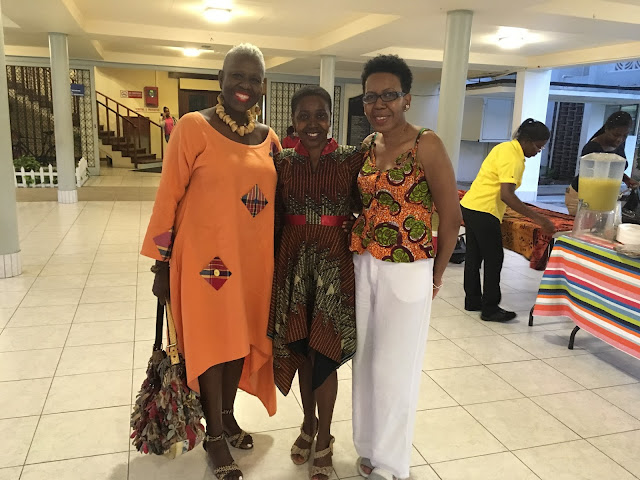By Neil Armstrong
 |
| Shannon Ryan, executive director of the Black Coalition for AIDS Prevention, left, and Andrew B. Campbell, chair of the board of directors at Black CAP's annual general meeting on Sept. 21, 2017. |
Despite funding challenges, the Black Coalition for AIDS
Prevention (Black CAP) has described the past year as one of program growth and
stability.
Shannon Ryan, executive director, says like many small AIDS
service organizations, Black CAP struggles to keep its doors open.
At its annual general meeting on September 21 in Toronto,
Ryan noted that the agency continues to be under-resourced as funding from its
core funder, the AIDS Bureau, has not increased since 2011.
“With inflation this essentially means our core funding has
been reduced by almost ten percent over this time. As a result, we struggle
with issues of cash flow, staff salaries, benefits costs, occupancy costs, and
are increasingly relying on community members to help us fill some of the gaps
in order for us to continue our work.”
In spite of this, Ryan said the agency made significant
gains.
He noted in the 2016/2017 annual report that in the past year,
more so than in the last decade, the sector had seen significant advancements
in prevention technologies related to pre-exposure prophylaxis (PrEP), undetectable
viral load, post-exposure prophylaxis (PEP) and issues such as undetectable
equals untransmittable (U=U), and criminalization.
“We have worked to keep pace with these changes and have
tried to ensure that our clients and community are as informed as possible
about these developments.”
Ryan said more than ever Black CAP is required to work in
new ways to ensure an alignment with the new provincial HIV/AIDS Strategy to
2026.
“This includes a focus on the HIV treatment cascade to
ensure that those living with HIV in our community are diagnosed, engaged in
care and attain an undetectable viral load. Our work along the cascade
recognizes some of the specific barriers that African, Caribbean and Black
(ACB) communities experience as they work to maintain and manage their health,”
he said.
Over the past year, Black CAP expanded its work with trans communities
through the planning of a pilot intervention for racialized trans women called
T-Love.
In March 2017, it received funding from the City of Toronto
to launch the fourth iteration of the Toronto For All campaign focused on
racialized trans youth issues.
The agency participated in a number of research studies to
expand its understanding of the impact of HIV in the community.
This included research to better understand the feasibility
of PrEP in ACB communities, research to address HIV risk between positive ACB
people and their negative partners, and research to understand HIV risk for ACB
people after migrating to Canada.
After two years of research and development, the agency has
finalized the “My Black is Healthy” website (myblack.is).
This site was developed for gay, bisexual, and other black
men who have sex with men who are looking for accurate health information
and/or connections to healthcare services and supports.
Staff also participated in several training opportunities
including naloxone, fentanyl, AR/AO, the science of HIV transmission and
others.
Over the year, the agency has worked with more than 700
clients who required supports related to their HIV and immigration status. This
includes more than 230 individuals living with HIV and 400 affected and at
risk.
Working to address anti-black racism in the city, Black CAP
hosted a series of community consultations on behalf of the City of Toronto to
support the municipal government’s “Toronto Action Plan to Confront Anti-Black
Racism.”
Andrew Campbell, board chair, provided an update on the
establishment of a steering committee that is exploring the feasibility of
merging Black CAP and Africans in Partnership Against AIDS (APAA).
“Several factors contribute to the need for this exploration
process. The funding environment has become much more competitive over the past
five years and our agencies compete for the same dollars. HIV related funding
at the provincial and federal levels has also been frozen for a number of years
and these funders are increasingly demanding that agencies such as ours
collaborate, align our programming to their strategic objectives and look for
service integration opportunities,” notes a printed update presented at the
meeting.
Both APAA, established in 1993, and Black CAP, in 1989, have
long histories of addressing HIV in Toronto’s diverse African, Caribbean and
Black communities.
The merger exploration steering committee is comprised of
eight individuals from both boards.
[This story has been published in the North American Weekly Gleaner, Sept. 28-Oct.4, 2017 issue.]

























